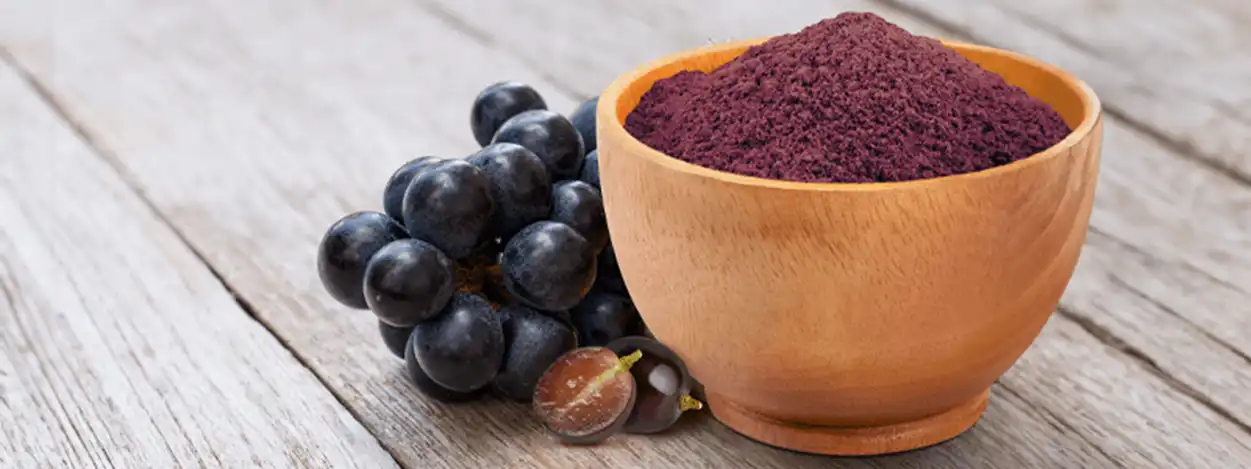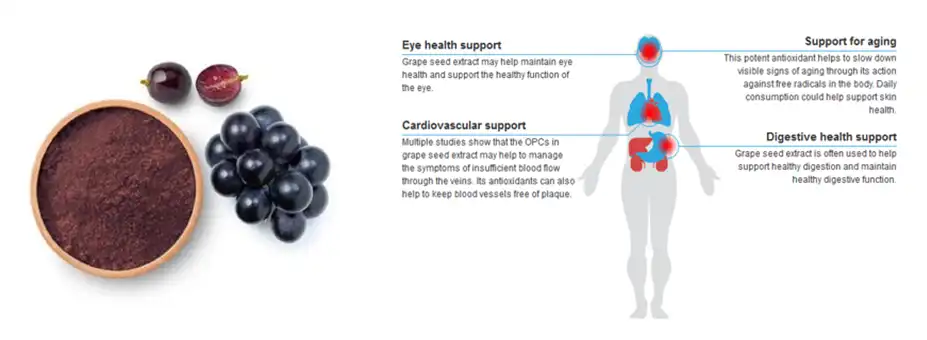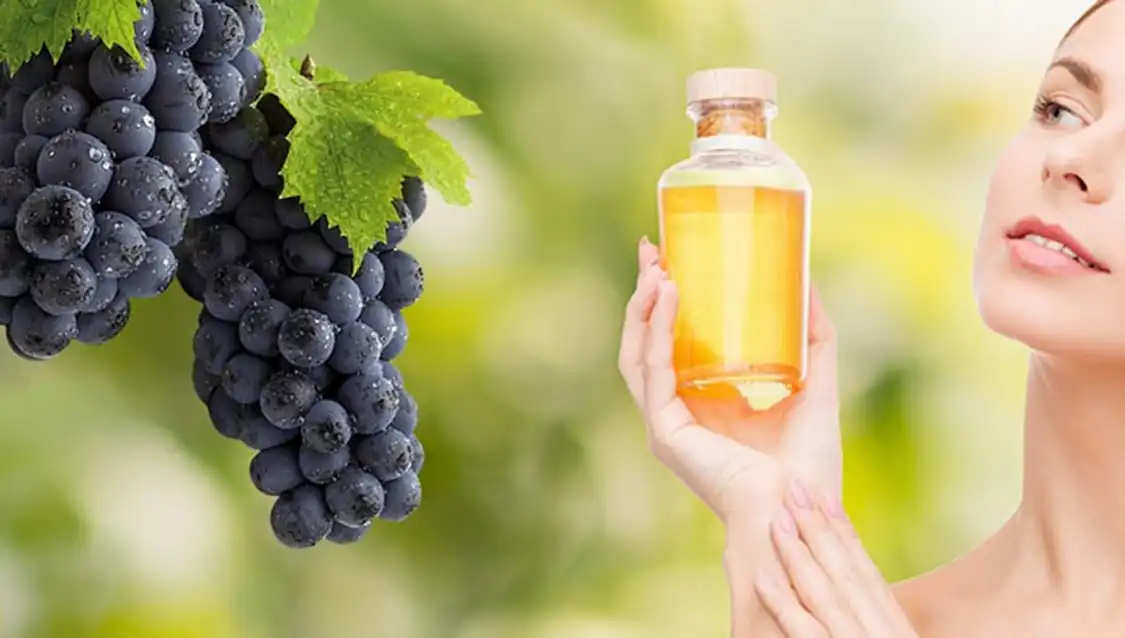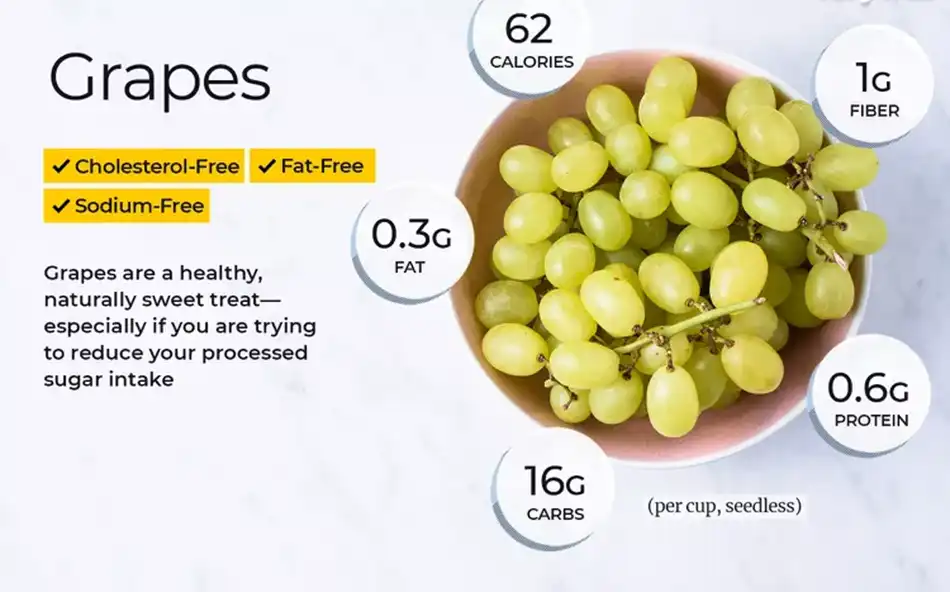Grape Skin Color Extract: Why It's a Powerhouse of Goodness
Grape Skin Color Extract: A Natural Color with Health-Boosting Benefits
What is Grape Skin Color?
Grape Skin Color, commonly used in the food and beverage industry, is a natural colorant extracted from the skins of red or purple grapes. It gives a reddish-purple hue, perfect for adding vibrancy and appeal to a variety of products. Beyond its aesthetic value, grape skin color represents a sustainable and health-conscious choice, as it aligns with a broader movement toward natural and minimally processed ingredients. This coloring method captures the essence of the fruit’s journey—from vine to vibrant pigment—and its appeal lies in being both naturally derived and rich in anthocyanins, which are beneficial antioxidants.
Using grape skin color can resonate with consumers who value authenticity, sustainability, and health in their food choices. It's not just about adding color but embodying a deeper commitment to quality and environmental stewardship. Its usage in products can be a statement—a celebration of nature's own palette, a choice that honors the beauty and richness of our natural resources.

Why Choose Grape Skin Color Extract?
Natural, Clean-Label Appeal: Today’s consumers demand transparency, and Grape Skin Color Extract delivers a pure, plant-based solution that meets expectations for natural, minimally processed ingredients.
Health Benefits: Loaded with anthocyanins, Grape Skin Color Extract doesn’t just add color—it adds value. Anthocyanins are known to help fight inflammation, boost immune health, and contribute to cardiovascular wellness, making this extract ideal for products targeting the wellness market.
Versatile Applications: Grape Skin Color Extract’s vibrant color is stable in various applications, including beverages, dairy, confectionery, and baked goods. It adapts beautifully to different product types, ensuring a consistent and appealing appearance.
As we embrace the shift toward natural ingredients, Grape Skin Color Extract offers a sustainable, health-oriented option that enhances both the visual and nutritional value of products. In every sense, it’s a coloring with purpose, reflecting nature’s vibrancy and bringing authenticity to the products consumers trust and love.

How to Incorporate Grape Skins into Your Diet
Incorporating grape skins into your diet is a simple yet powerful way to boost your intake of antioxidants and essential nutrients. Grape skins are a rich source of fiber, vitamins, and potent compounds like polyphenols and resveratrol, which are known to support heart health, aid digestion, and combat oxidative stress.
Here are some creative and delicious ways to include grape skins in your daily meals:
Smoothies: Adding grape skins to smoothies gives them a vibrant color and a nutrient boost. Blend a handful of grape skins with fruits like bananas, berries, and leafy greens for a heart-healthy, fiber-rich drink. This method preserves the skins’ natural antioxidants, allowing you to enjoy the full health benefits.
Baking: Dried and powdered grape skins can be used in baking for an added nutritional punch. Mix the powder into muffins, pancakes, or bread for subtle sweetness and a purple tint, enriching these treats with the goodness of grapes.
Sauces and Dressings: Grape skins can be simmered with sauces or blended into dressings to add a unique, slightly tart flavor. Try blending them into a homemade balsamic vinaigrette or simmering with tomato sauce for pasta dishes. The natural acidity of grape skins can add depth to savory meals.
Snacks: Dried grape skins make for a nutritious snack on their own or mixed into trail mixes with nuts and seeds. They provide a pleasant texture and a hit of natural flavor, perfect for a quick, antioxidant-rich boost.
Tea: Steeping dried grape skins in hot water creates a calming, antioxidant-rich tea. This gentle extraction process releases anthocyanins, helping to promote relaxation and overall wellness with every sip.
Incorporating grape skins into your diet isn’t just about nutrition—it’s a way of connecting with food in its most natural form. Utilizing the whole grape, skin included, embodies sustainability and respect for what nature provides, honoring the grape’s full potential. This small but powerful choice promotes a holistic approach to health, reminding us that every part of what we consume has value, flavor, and purpose.
Grapes Extract Benefits for Your Skin
·
rape extract offers powerful and rejuvenating benefits for the skin, making it a popular ingredient in skincare. Derived from the seeds, skins, and sometimes even the stems of grapes, this extract is a rich source of antioxidants, particularly polyphenols, vitamins C and E, and resveratrol. Together, these compounds help combat environmental stressors, reduce inflammation, and support skin's natural regeneration—leading to a youthful, radiant complexion.
Here are some deeper insights into the benefits of grape extract for the skin:
Anti-Aging Powerhouse: Grape extract is loaded with antioxidants like resveratrol, which neutralize free radicals that can cause premature aging. By protecting collagen and elastin fibers, it helps reduce the appearance of fine lines and wrinkles, promoting firmer, more resilient skin.
Brightens and Evens Skin Tone: The extract’s high vitamin C content plays a key role in diminishing dark spots and evening out skin tone. It gently fades hyperpigmentation and revitalizes dull skin, making your complexion look bright, clear, and more uniform.
Hydration and Barrier Support: Grape extract contains natural oils and essential fatty acids that nourish and hydrate the skin, reinforcing its natural barrier. This not only helps retain moisture but also protects against irritants, leaving skin soft, supple, and resilient against daily stressors.
Soothes and Reduces Inflammation: The polyphenols and flavonoids in grape extract have strong anti-inflammatory properties, which can calm redness and irritation, making it ideal for sensitive or acne-prone skin. It soothes flare-ups and balances the skin, promoting a healthier complexion over time.
Fights Acne and Reduces Scarring: With its natural antimicrobial properties, grape extract can help manage acne-causing bacteria, keeping breakouts at bay. The antioxidants support healing processes, which may reduce the appearance of acne scars and improve skin texture.
Using grape extract on your skin is a holistic, nature-inspired approach to beauty. It’s not just a treatment but a way of nourishing the skin in harmony with the earth's resources. Choosing grape extract is a commitment to clean, effective skincare that respects both your skin and the environment, reminding us that beauty and wellness can go hand-in-hand with sustainability.

Application of Grapes Extract Powder
Grape Extract Powder is a versatile and potent ingredient used in various applications across food, supplements, cosmetics, and wellness products. Known for its high concentration of antioxidants, particularly polyphenols and resveratrol, it brings health benefits and natural enhancement to whatever it’s added to. Here’s how it’s commonly applied and the benefits it provides:
1. Dietary Supplements
Capsules and Powders: Grape Extract Powder is often encapsulated or added to powdered supplements. Its antioxidants support heart health, boost immunity, and improve overall vitality.
Smoothies and Shakes: Adding a scoop of Grape Extract Powder to smoothies or shakes enhances nutritional value and provides a dose of natural antioxidants, supporting cellular health and reducing oxidative stress.
2. Functional Foods and Beverages
Energy Bars and Health Snacks: Used as an ingredient in health snacks, grape extract powder not only adds nutritional value but also brings a mild fruity flavor, making it a great fit for energy bars, granola, and snack bites.
Juices and Teas: The powder can be easily mixed into beverages like teas or juices to enrich them with antioxidants and give them a subtle grape flavor, promoting hydration and wellness on-the-go.
3. Skincare and Cosmetics
Face Masks and Serums: In skincare, grape extract powder is incorporated into face masks, creams, and serums for its anti-aging, brightening, and skin-calming properties. It protects the skin from environmental damage, supports collagen production, and helps even out skin tone.
Lotions and Body Scrubs: Grape extract is often added to lotions and scrubs for its hydrating and rejuvenating effects, helping to soften and nourish the skin while enhancing elasticity.
4. Bakery and Confectionery
Baked Goods and Sweets: In baked goods, grape extract powder can be used to infuse subtle flavor and color while adding a boost of nutrients. It’s an ideal ingredient for healthier versions of cookies, muffins, and candies, where it also acts as a natural preservative.
5. Pharmaceutical Applications
Antioxidant and Anti-Inflammatory Formulations: Used in pharmaceutical products, grape extract powder leverages its anti-inflammatory and antioxidant properties for joint health supplements and anti-inflammatory medicines.
6. Personalized Wellness Products
Herbal Teas and Infusions: Added to herbal tea blends, grape extract powder provides a calming, antioxidant-rich infusion that supports wellness from within, making it a popular ingredient in wellness rituals.
Aromatherapy: Some wellness brands use grape extract powder for its scent and calming properties in aromatherapy blends, candles, or bath soaks, which are crafted to promote relaxation and reduce stress.
Deeper Significance of Using Grape Extract Powder
Incorporating grape extract powder into products or daily routines isn’t just about adding nutrients—it’s about embracing a holistic approach to wellness and beauty. The powder embodies the essence of the grape, harnessing its life cycle to bring its concentrated goodness into our lives. Every application of grape extract powder is a reminder of nature’s ability to heal, nurture, and protect, making it a choice that aligns with a lifestyle rooted in sustainability and respect for natural resources.
Grape Nutrition Facts
One cup of grapes (92g) provides 62 calories, 0.6g of protein, 16g of carbohydrates, and 0.3g of fat. Grapes are an excellent source of vitamins C and K. The following nutrition information is provided by the USDA.
· Calories: 62
· Fat: 0.3g
· Sodium: 2mg
· Carbohydrates: 16g
· Fiber: 1g
· Sugars: 15g
· Protein: 0.6g
· Vitamin C: 3.68mg
· Vitamin K: 13.4mcg
· Vitamin A: 4.6mcg
Carbs
Most of the calories in grapes come from carbs, of which the majority are sugars. Each grape contains about one gram of carbohydrate. The glycemic index of grapes is estimated to be about 59, while the glycemic load for a one-cup serving is 11.
Fats
Grapes are a nearly fat-free food, providing far less than 1 gram per serving.
Protein
There is just 1 gram of protein per serving of grapes. They pair well with cheese and nuts, which are good sources of protein and can help build a balanced, satisfying snack.
Vitamins and Minerals
Grapes are an excellent source of vitamin K and manganese. You'll also benefit from a healthy dose of vitamin C, which helps to keep immunity high and aids in repairing tissues, such as healing wounds.
Calories
Grapes average about 62 calories per cup. Seedless red grapes have about 86 calories per 100g, which is slightly more than one cup. By contrast, seedless green grapes contain 80 calories per 100g
Where to Buy Grapes Extract Powder?
You can buy Grapes Extract Powder at YANGGEBIOTECH Company is an industry-leading manufacturer and distributor for pure dietary supplements. yanggebiotech.com is not just a consumer brand. It also supplies pure ingredients to other brands that distribute food and other supplement products. Contact yanggebiotech.com to place an order today.
Why YANGGEBIOTECH is the Best Company to Buy Grape Skin Color Extract!
When it comes to sourcing high-quality grape skin color extract, Yangge Biotech stands out as the best choice for several compelling reasons:
Premium Quality: Yangge Biotech prioritizes quality, utilizing advanced extraction methods that preserve the full potency and natural properties of grape skins. This ensures a vibrant, consistent product rich in antioxidants and color.
Sustainability: Committed to environmentally friendly practices, Yangge Biotech sources its raw materials responsibly, promoting sustainability throughout its supply chain. This means you can feel good about the impact of your purchase.
Innovation and Research: With a strong focus on research and development, Yangge Biotech continuously explores innovative uses and formulations of grape skin extract, ensuring their products meet the evolving needs of the food, beverage, and cosmetic industries.
Customization: They offer tailored solutions to meet specific customer requirements, whether you need bulk quantities or unique formulations, making them a versatile partner for businesses of all sizes.
Expertise and Trust: Backed by a team of experts in natural colorants, Yangge Biotech has established a reputation for reliability and excellence in the industry, giving you confidence in their products.
Choosing Yangge Biotech for grape skin color extract means opting for quality, sustainability, and innovation—making them the ideal partner for your natural ingredient needs.
References
· https://pubmed.ncbi.nlm.nih.gov/24007424/
· https://www.sciencedirect.com/science/article/abs/pii/S0308814608015161?via%3Dihub
· https://pubmed.ncbi.nlm.nih.gov/28914789/
· https://pubmed.ncbi.nlm.nih.gov/24007424/
· https://www.ncbi.nlm.nih.gov/pubmed/16740737
· https://www.ncbi.nlm.nih.gov/pubmed/12834296
· https://www.ncbi.nlm.nih.gov/pubmed/17950783
· https://www.ncbi.nlm.nih.gov/pubmed/22752876
· https://pubmed.ncbi.nlm.nih.gov/21802563/
· https://www.ncbi.nlm.nih.gov/pubmed/28208630
· https://www.ncbi.nlm.nih.gov/pmc/articles/PMC4258672/
· https://www.ncbi.nlm.nih.gov/pubmed/27847215
· https://www.ncbi.nlm.nih.gov/pubmed/28903761
· https://www.ncbi.nlm.nih.gov/pubmed/24705696
· https://www.ncbi.nlm.nih.gov/pubmed/17616006
· https://www.ncbi.nlm.nih.gov/pubmed/14564675
· https://www.ncbi.nlm.nih.gov/pubmed/28074795
· https://www.ncbi.nlm.nih.gov/pubmed/12475295
· https://www.ncbi.nlm.nih.gov/pubmed/26568249
· https://www.ncbi.nlm.nih.gov/pmc/articles/PMC7054588/
· https://www.ncbi.nlm.nih.gov/pmc/articles/PMC3916869/
· https://pubmed.ncbi.nlm.nih.gov/16889756
· https://www.ncbi.nlm.nih.gov/pmc/articles/PMC2919277/
· https://www.ncbi.nlm.nih.gov/pmc/articles/PMC3752337/
· https://pubmed.ncbi.nlm.nih.gov/19780653
· https://www.ncbi.nlm.nih.gov/pmc/articles/PMC3330269/
· https://www.ncbi.nlm.nih.gov/pmc/articles/PMC3608517/
· https://books.google.com/books?id=Dfa4vlydjdAC&lpg=PP1&ots=A1TS6kp6r9&lr&pg=PP1#v=onepage&q&f=false
· https://pubmed.ncbi.nlm.nih.gov/11749811
· https://www.ncbi.nlm.nih.gov/pubmed/23251512
· https://www.ncbi.nlm.nih.gov/pubmed/23759204
· https://www.ncbi.nlm.nih.gov/pubmed/19446580
· https://www.ncbi.nlm.nih.gov/pmc/articles/PMC4288281/
· https://www.ncbi.nlm.nih.gov/pubmed/23314139
· https://www.ncbi.nlm.nih.gov/pubmed/22257215
· https://www.ncbi.nlm.nih.gov/pubmed/22677922
· https://www.ncbi.nlm.nih.gov/pubmed/9875688
· https://www.ncbi.nlm.nih.gov/pubmed/9619118
· https://www.ncbi.nlm.nih.gov/pubmed/19381798
· https://www.sciencedirect.com/science/article/pii/S0956713512002976
· https://www.sciencedirect.com/science/article/pii/S0956713514006586
· https://www.ncbi.nlm.nih.gov/pubmed/20519844
· https://www.ncbi.nlm.nih.gov/pmc/articles/PMC4017847/
· https://www.ncbi.nlm.nih.gov/pubmed/25948437
· https://www.ncbi.nlm.nih.gov/pmc/articles/PMC2928446/
· https://pubmed.ncbi.nlm.nih.gov/25402429/
· https://www.sciencedirect.com/science/article/pii/B9780123984562000633
· https://www.sciencedirect.com/topics/biochemistry-genetics-and-molecular-biology/grape-seed-extract
· https://www.ncbi.nlm.nih.gov/pubmed/15693829
· https://www.ncbi.nlm.nih.gov/pubmed/15951633
Send Inquiry
Related Industry Knowledge
- What Happens To Your Body After Taking Creatine For 30 Days?
- The BEST Way To Use Creatine For Muscle Growth (4 STEPS)
- Can Beetroot Boost Our Performance?
- HMB Increases Muscle More Than Steroids?
- When Is The Best Time To Drink Kombucha?
- Is Butterfly Pea Tea Safe?
- 5 Easy Butterfly Pea Tea Drinks To Make | Cafe Drink Ideas




